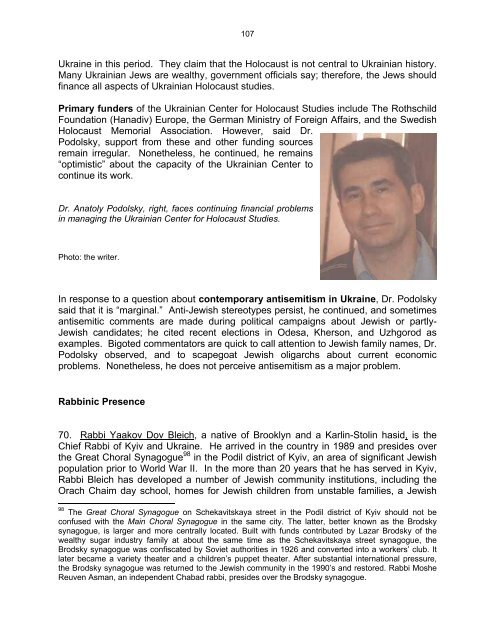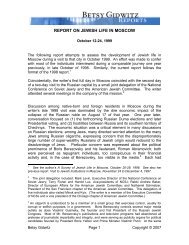(Dnipropetrovsk, Kharkiv, Krivoi Rog, Donetsk, and Kyiv) Report of a ...
(Dnipropetrovsk, Kharkiv, Krivoi Rog, Donetsk, and Kyiv) Report of a ...
(Dnipropetrovsk, Kharkiv, Krivoi Rog, Donetsk, and Kyiv) Report of a ...
Create successful ePaper yourself
Turn your PDF publications into a flip-book with our unique Google optimized e-Paper software.
107<br />
Ukraine in this period. They claim that the Holocaust is not central to Ukrainian history.<br />
Many Ukrainian Jews are wealthy, government <strong>of</strong>ficials say; therefore, the Jews should<br />
finance all aspects <strong>of</strong> Ukrainian Holocaust studies.<br />
Primary funders <strong>of</strong> the Ukrainian Center for Holocaust Studies include The Rothschild<br />
Foundation (Hanadiv) Europe, the German Ministry <strong>of</strong> Foreign Affairs, <strong>and</strong> the Swedish<br />
Holocaust Memorial Association. However, said Dr.<br />
Podolsky, support from these <strong>and</strong> other funding sources<br />
remain irregular. Nonetheless, he continued, he remains<br />
“optimistic” about the capacity <strong>of</strong> the Ukrainian Center to<br />
continue its work.<br />
Dr. Anatoly Podolsky, right, faces continuing financial problems<br />
in managing the Ukrainian Center for Holocaust Studies.<br />
Photo: the writer.<br />
In response to a question about contemporary antisemitism in Ukraine, Dr. Podolsky<br />
said that it is “marginal.” Anti-Jewish stereotypes persist, he continued, <strong>and</strong> sometimes<br />
antisemitic comments are made during political campaigns about Jewish or partly-<br />
Jewish c<strong>and</strong>idates; he cited recent elections in Odesa, Kherson, <strong>and</strong> Uzhgorod as<br />
examples. Bigoted commentators are quick to call attention to Jewish family names, Dr.<br />
Podolsky observed, <strong>and</strong> to scapegoat Jewish oligarchs about current economic<br />
problems. Nonetheless, he does not perceive antisemitism as a major problem.<br />
Rabbinic Presence<br />
70. Rabbi Yaakov Dov Bleich, a native <strong>of</strong> Brooklyn <strong>and</strong> a Karlin-Stolin hasid, is the<br />
Chief Rabbi <strong>of</strong> <strong>Kyiv</strong> <strong>and</strong> Ukraine. He arrived in the country in 1989 <strong>and</strong> presides over<br />
the Great Choral Synagogue 98 in the Podil district <strong>of</strong> <strong>Kyiv</strong>, an area <strong>of</strong> significant Jewish<br />
population prior to World War II. In the more than 20 years that he has served in <strong>Kyiv</strong>,<br />
Rabbi Bleich has developed a number <strong>of</strong> Jewish community institutions, including the<br />
Orach Chaim day school, homes for Jewish children from unstable families, a Jewish<br />
98 The Great Choral Synagogue on Schekavitskaya street in the Podil district <strong>of</strong> <strong>Kyiv</strong> should not be<br />
confused with the Main Choral Synagogue in the same city. The latter, better known as the Brodsky<br />
synagogue, is larger <strong>and</strong> more centrally located. Built with funds contributed by Lazar Brodsky <strong>of</strong> the<br />
wealthy sugar industry family at about the same time as the Schekavitskaya street synagogue, the<br />
Brodsky synagogue was confiscated by Soviet authorities in 1926 <strong>and</strong> converted into a workers’ club. It<br />
later became a variety theater <strong>and</strong> a children’s puppet theater. After substantial international pressure,<br />
the Brodsky synagogue was returned to the Jewish community in the 1990’s <strong>and</strong> restored. Rabbi Moshe<br />
Reuven Asman, an independent Chabad rabbi, presides over the Brodsky synagogue.



